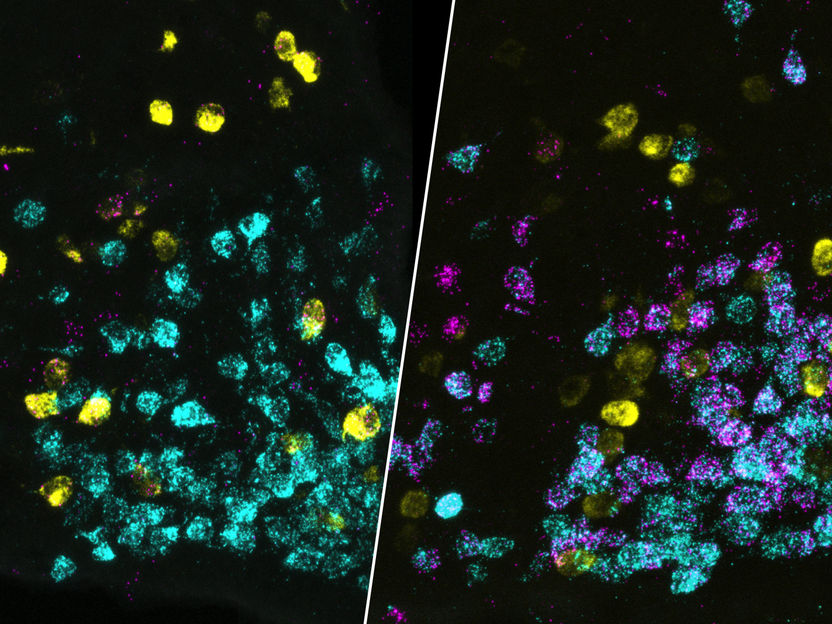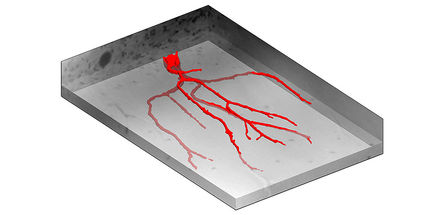Hungry? Brain tells liver to start recycling
Brain releases hormone after short fasting that boosts autophagy
Advertisement
Fasting triggers autophagy in our body. The body switches on the waste disposal system in the cells and gains new energy. Researchers at the Max Planck Institute for Metabolism Research in Cologne have now shown in mice that the brain plays a decisive role in this process. Even after a short period of fasting, the brain triggers the release of the hormone corticosterone and thus initiates autophagy in the liver. Until now, it was assumed that mainly the liver cells themselves were responsible for this. In the long term, these findings could help us understand why fasting is so healthy for the body.

AgRP neurons in the brain are activated by fasting. The images show immunostaining of neurons from mice that fast for 4 hours (right) and mice that do not fast (left).
Weiyi Chen, Max-Planck-Institut für Stoffwechselforschung
Autophagy is essential for survival. Defective or damaged molecules are shredded and degraded by the cell's own waste disposal system and new energy is generated from this. This kind of detoxification of the body keeps the body fit and very likely young. "Until now, it was assumed that our body cells mainly themselves sense when they are low on energy and then boost autophagy," explains Weiyi Chen, a postdoctoral researcher at the Max Planck Institute for Metabolism Research and first author of the study published in Cell Metabolism. "But now we have found in mice that the brain plays a crucial role."
No breakfast
In their study, the researchers did not feed mice for four hours, precisely the time when they normally eat a lot. This is comparable to skipping breakfast, however, mice consume about 40% of their food at breakfast. They then studied how AgRP neurons, a group of 3000 neurons in the brain's hunger centre, the hypothalamus, responded to this short fast. Surprisingly, they found that during fasting, the brain not only sends signals that stimulate the organism to eat, but also signals that activate autophagy.
Brain communicates with liver
The researchers were also able to identify how the brain communicates with the liver. When energy levels are low, the nerve cells trigger the release of the hormone corticosterone, which then stimulates the activation of autophagy in the liver cells. They were also able to clarify in detail the exact pathways that the signal travels in the brain and thus determine which nerve cells are involved in the process. They were also able to show that blocking this signal transmission leads to autophagy not kicking in despite fasting. The researchers assume that the brain gives the first initial signal to initiate autophagy quickly. They think that the cells in the liver would also start the recycling system themselves, but only at a later stage.
"Our study shows that autophagy is not only controlled in the body cells themselves, but also by the brain. In the long term, we would like to find out whether this newly discovered mechanism in the brain contributes to the positive effects of fasting," explains Jens Brüning, head of the study and director at the Max Planck Institute for Metabolism Research.
Original publication
Weiyi Chen, Oliver Mehlkop, Alexandra Scharn, Hendrik Nolte, Paul Klemm, Sinika Henschke, Lukas Steuernagel, Tamara Sotelo-Hitschfeld, Ecem Kaya, Claudia Maria Wunderlich, Thomas Langer, Natalia L. Kononenko, Patrick Giavalisco, Jens Claus Brüning; Nutrient sensing AgRP neurons relay control of liver autophagy during energy deprivation; Cell Metabolism, April 18th 2023

























































